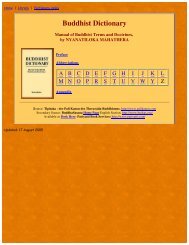The Three Basic Facts of Existence II: Suffering (Dukkha) - Buddhist ...
The Three Basic Facts of Existence II: Suffering (Dukkha) - Buddhist ...
The Three Basic Facts of Existence II: Suffering (Dukkha) - Buddhist ...
- No tags were found...
Create successful ePaper yourself
Turn your PDF publications into a flip-book with our unique Google optimized e-Paper software.
same awareness <strong>of</strong> lack—choice implies lack, and as intrinsically lack we are condemned tochoose. This choice also implies another facet <strong>of</strong> our being—as contingent: “In anguish we donot simply apprehend the fact that the possibles which we project are perpetually eaten awayby our freedom-to-come; in addition we apprehend our choice—i.e., ourselves—asunjustifiable.” 30 <strong>Dukkha</strong>, that is existence experienced, thus gives us its final definition—thatwhich gives us the possibility <strong>of</strong> its negation: “<strong>The</strong> essential thing is contingency. I mean that bydefinition existence is not necessity.” 31 thus in dukkha we have the “absurd”—it has nonecessity to be and we are Sartre’s term “too-much” (de trop)—superfluous, for we are existedtowards an unattainable goal that <strong>of</strong> filling lack. Sartre’s famous conclusion might have beenspoken by the Buddha—“man is a useless passion.”We usually try to avoid the anguish <strong>of</strong> our freedom by the self-deceit <strong>of</strong> “bad-faith” (mauvaisefoi) or the spirit <strong>of</strong> “seriousness”—both an escape to the role, an attempt to assume a static andthus “complete” being; or the myth <strong>of</strong> destiny or other evasion <strong>of</strong> free choice. This playing <strong>of</strong>roles gives us the alienated (or in Camus term “estranged”) individual—alienated that is fromreality, from authentic being. <strong>The</strong> alienated individual is not a now concept, this was spoken inthe 6th Century B.C.: “Man is estranged from that with which he is most familiar” 32 —but todayit is our norm. Individuals are too isolated—there is always that gulf that cannot be bridged:“<strong>The</strong> heart knoweth his own bitterness; and a stranger doth not intermeddle with his joy.” 33And there is no better image <strong>of</strong> isolation, significance and meaninglessness than this line: “Menand bits <strong>of</strong> paper, whirled by the cold wind.” 34 Modern poetry <strong>of</strong>ten expresses very clearly thisterrible emptiness and the tedium <strong>of</strong> alienated existence: “I have known the inexorable sadness<strong>of</strong> pencils, neat in their boxes, dolour <strong>of</strong> pad and paper-weight, all the misery <strong>of</strong> manilla foldersand mucilage, desolation in immaculate public places … Endless duplication <strong>of</strong> lives andobjects…” 35 And that this sickness not only eats away life but becomes pathological as neurosisis seen from C.G. Jung’s observation: “About one-third <strong>of</strong> my patients are suffering from noclinically definable neurosis, but from the senselessness and emptiness <strong>of</strong> their lives.” 36It is this senselessness that is our tragedy—the superficial round, we endlessly repeat thesame silly tasks because we see them as necessary. Great suffering can be endured—it has ameaning, tragedy has a “moral,” a reason; our suffering has no saving reason, it teaches usnothing. “Great men have great suffering” Nietzsche wrote, their suffering has a meaning: itwas the mark <strong>of</strong> their greatness. This is why he too saw a repetition, a round <strong>of</strong> “eternalrecurrence,” and gloried in it—only the “overman” would joyously grasp a majestic sufferingrepeated for ever, the defining <strong>of</strong> his existence. But we are all trapped in eternal recurrence butwith a load far more crushing than Nietzsche’s heroes—our suffering has no necessity and nopurpose. We are not Promethean heroes crushed by suffering but still defying heaven and thefates—suffering is negated by such defiance, such scorn: “<strong>The</strong>re is no fate that cannot besurmounted by scorn.” 37 We are rather Dostoevsky’s “Underground Man,” puny, insignificant,—we are not warrior heroes but court jesters. We are not crushed by adversity but smothered inthe futility and pettiness <strong>of</strong> our drab existence. We are not destroyed in a blaze <strong>of</strong> glory but fadeout in commonplace insignificance. We have no terrible destiny to lament, no cruel fate to railagainst, we have only our own freedom to take part in the drab and dreary comedy <strong>of</strong> life,where stale jokes are repeated for ever. We are in Kierkegaard’s phrase “mocked by existence.”30Sartre. ibid., p. 440.31Sartre: Nausee.32Heraclitus: Fragment.33Proverbs.34T. S Eliot: Burnt Norton.35<strong>The</strong>odore Roethke: Dolour.36C.G. Jung: Memories, Dreams, Reflections.37Camus: Myth de Sisyphe.17
















